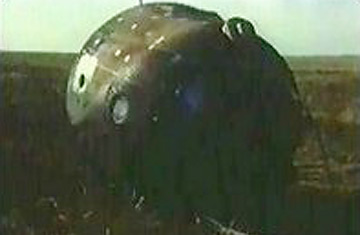
The Soyuz 11 landing module after its return from space.
June 29, 1971 — The most harrowing moments of any re-entry from space are the long minutes when the crew is out of radio contact. The flaming, high-speed plunge through the soup of Earthly air causes a shroud of ions to form around the ship, scrambling radio communications. It's only near the end of the descent, once the parachutes have deployed and the spacecraft has slowed, that controllers can talk to the crew and ensure they've come through the ordeal unharmed. When Soyuz 11 arrived at that usually happy moment, there was no sound from the ship. Controllers tried hailing the cosmonauts again and still nothing. Like all Russian ships, Soyuz 11 thumped down on land instead of splashing down in the ocean, and when recovery teams rushed to the site and opened the hatch, they found all three men still strapped into their couches, eyes closed, seemingly asleep. But they weren't asleep. A faulty vent had released cabin air during re-entry, suffocating the crew. There was one consolation for both the devastated Russians and the sorrowful Americans: the crew had not, as feared, died as a result of its extended stay in space but rather from a fixable mechanical error. The Soviets would make other long-duration trips — each a Salyut to their three lost men.